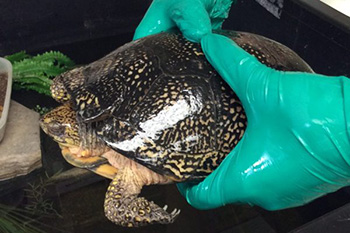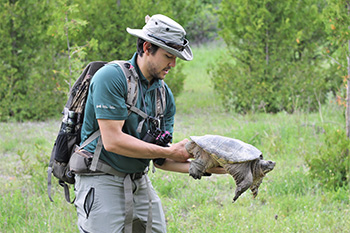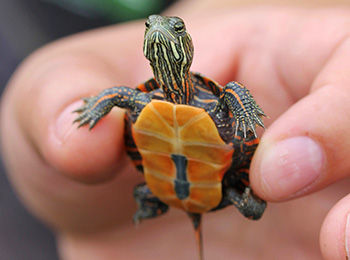
How to help a turtle cross the road
There are eight species of turtles in Ontario and all eight of them are listed as Species at Risk. There are several factors contributing to their decline in population. However, one of the biggest threats to turtles is road mortality.
Turtles on the road need our help
If you are visiting a national park in Ontario and spot a turtle on the road, call the phone number of the park you are visiting. Parks Canada staff will come to assist.
If you come across a turtle on a road outside of a Parks Canada administered site, follow these steps to properly help it to safety.
How to help turtles cross the road

- First and foremost, ensure that you are able to pull over to the side of the road, and exit your vehicle safely. Be aware of oncoming traffic. Although it is important to help turtles on the road, your safety, and that of other road users, should be your number one concern.
- Approach the turtle from behind and pick it up with two hands in the middle of the turtle’s shell like a hamburger using gloves if available.
- Never pick a turtle up by the tail, it can cause serious spinal injuries!
- Help the turtle cross the road in the direction it is facing, even if you think it looks like there is nicer habitat behind it. There is a reason the turtle is going that direction and if you bring it back to where it already was, it will just try to cross the road again.
- Make sure you take the turtle right off the shoulder of the road and into the ditch to make sure it is completely safe and far away from traffic.
- Always wash your hands thoroughly after handling a turtle. Turtles can carry bacteria that aren't harmful to them, but may cause issues for humans.
*See below for instructions on how to help snapping turtles cross the road
How to help snapping turtles cross the road

- Always approach a snapping turtle from behind.
- Lift the turtle up using the ‘pizza pie’ method: stabilize the tail with one hand, slide your other hand underneath the turtle from behind and lift.
- Keep your hands towards the back half of the turtle. Snapping turtles have long necks that can reach around and snap at you if you are holding it too close to its face.
- If you don’t feel comfortable picking up a snapping turtle, another tip is to have a small shovel in your car to help gently push the turtle from behind to the side of the road.
What to do if you find an injured turtle
If you are visiting a national park and you spot any injured wildlife, call the phone number of the park you are visiting. Parks Canada staff will come to assist.
If you find an injured turtle outside of a Parks Canada administered location, follow these steps:
- Ensure you are safe when exiting your vehicle and watch for oncoming traffic.
- Be very careful when moving the injured turtle as you don’t want to cause any more damage. If it is a snapping turtle, still be sure to use the special snapping turtle pick up method as they may still be able to snap even if they are injured.
- Place the turtle inside a dry box with air holes.
- Do not try to feed the turtle.
- Call the Ontario Turtle Conservation Centre (OTCC) at 705-741-5000. They will guide you on the next steps to get the turtle to proper rehabilitators as soon as possible, including arranging transport for it.
Remember! Turtles are extremely resilient. Even if the turtle’s injuries look very severe, follow these steps and get it to a rehabilitator as soon as possible. Many turtles with extremely serious injuries have still made full recoveries. Even if upon reaching the OTCC the turtle has passed away, often samples can be taken to check for disease, which are very useful for conservation. Moreover, if a female turtle is still carrying her eggs, the eggs can be incubated and later released.
Get involved

Looking to get involved further? There are several national parks in Ontario that are looking for volunteers to help with turtle conservation projects. Visit your local park’s website to find out more!
The OTCC can also always benefit from more Turtle Taxi Drivers. Turtle Taxi Drivers are part of a network of volunteers across Ontario that help to transport injured turtles to and from the OTCC and turtle ‘first responders’ to get the life saving care they need. Volunteers do not need any experience in wildlife handling to apply, all they need is access to a car!
- Date modified :